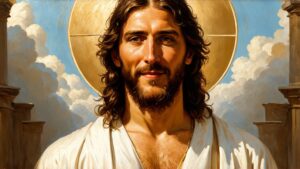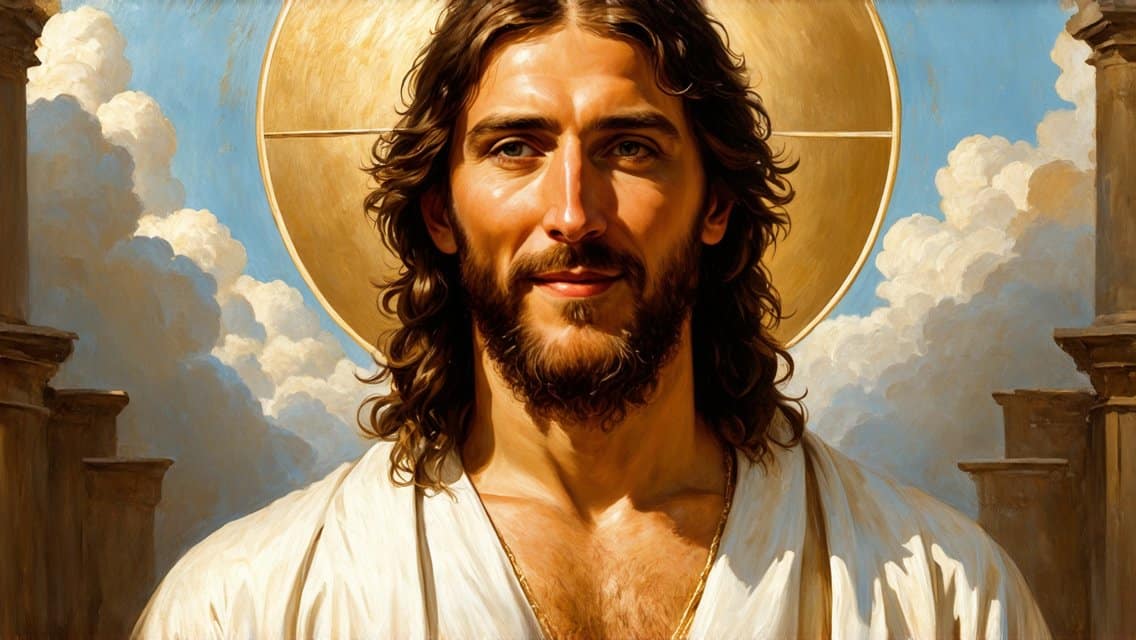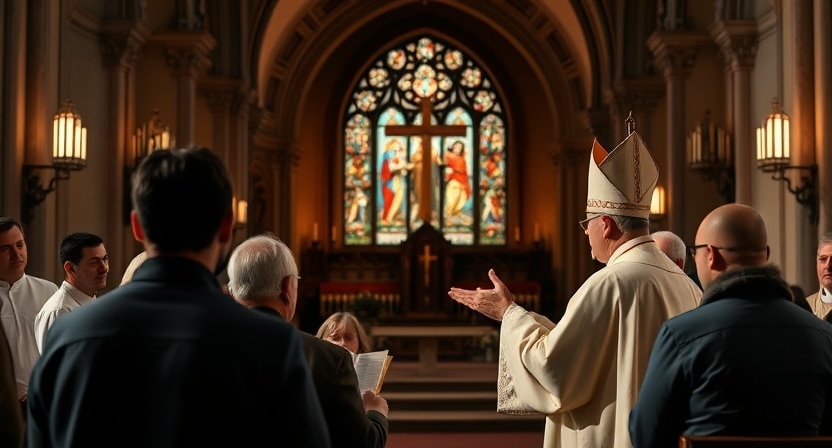EPIPHANY
Breaking down the barriers
INTRODUCTION AND CONFITEOR
Today we hear once again the story of the wise men who embarked on a long and hazardous journey in search of the Christ-child. What made them wise? It was the fact that, whereas his own people didn’t want to know him, they recognised this Child as the Saviour of the world.
What led us here this morning? What does Christ mean to us? [Pause]
Let us begin the Mass by offering to Christ, not our treasures, but our miseries, namely, our sins.
I confess to almighty God etc.
HEADINGS FOR READINGS
First Reading (Isaiah 60:1-6). The exiles returned from Babylon to find Jerusalem in ruins. The prophet cheers them up with a vision of a restored city. Her scattered children will return, and numerous strangers will come there to worship the true God.
Second Reading (Ephesians 3:2-35-6). Paul reveals the truth that God invites all, both Jew and Gentile, to share on an equal footing the salvation brought by Christ.
Gospel (Matthew 2:1-12). This tells how three strangers came from a far country to pay homage to the Christ-child, while the Jewish leaders rejected him.
1st Reading – Isaiah 60:1-6
1 Arise, be enlightened, O Jerusalem: for your light has come, and the glory of the Lord has risen upon you.
2 For, behold, darkness shall cover the earth, and a mist the people: but the Lord shall arise upon you and his glory shall be seen upon you.

3 And the Gentiles shall walk in your light, and kings in the brightness of your rising.
4 Lift up your eyes all around and see! All these have been gathered together; they have arrived before you. Your sons will arrive from far away, and your daughters will rise up from your side.
5 Then you will see, and you will overflow, and your heart will be amazed and expanded. When the multitude of the sea will have been converted to you, the strength of the nations will approach you.
6 A multitude of camels will inundate you: the dromedaries from Midian and Ephah. All those from Sheba will arrive, carrying gold and frankincense, and announcing praise to the Lord.
Responsorial Psalm – Psalms 72:1-2, 7-8, 10-11, 12-13.
R. (cf. 11) Lord, every nation on earth will adore you.
1 O God, with your judgment endow the king,
and with your justice, the king’s son;
2 He shall govern your people with justice
and your afflicted ones with judgment.
R. Lord, every nation on earth will adore you.
7 Justice shall flower in his days,
and profound peace, till the moon be no more.
8 May he rule from sea to sea,
and from the River to the ends of the earth.
R. Lord, every nation on earth will adore you.
10 The kings of Tarshish and the Isles shall offer gifts;
the kings of Arabia and Seba shall bring tribute.
11 All kings shall pay him homage,
all nations shall serve him.
R. Lord, every nation on earth will adore you.
12 For he shall rescue the poor when he cries out,
and the afflicted when he has no one to help him.
13 He shall have pity for the lowly and the poor;
the lives of the poor he shall save.
R. Lord, every nation on earth will adore you.
2nd Reading – Ephesians 3:2-3A, 5-6
Brothers and sisters:
2 You have heard of the stewardship of God’s grace that was given to me for your benefit,
3A How that, according to revelation, the mystery has been made known to me.
5 Which in other generations was not known to the sons of men, as it is now revealed to his holy apostles and prophets in the Spirit:
6 That the Gentiles should be fellow heirs, and of the same body, and co-partners of his promise in Christ Jesus, by the gospel.
Alleluia – Matthew 2:2
R. Alleluia, alleluia.
2 We saw his star at its rising
and have come to do him homage.
R. Alleluia, alleluia.
Gospel – Matthew 2:1-12
1 When Jesus had been born in Bethlehem of Judah, in the days of king Herod, behold, Magi from the east arrived in Jerusalem,
2 saying: “Where is he who was born king of the Jews? For we have seen his star in the east, and we have come to adore him.”
3 Now king Herod, hearing this, was disturbed, and all Jerusalem with him.
4 And gathering together all the leaders of the priests, and the scribes of the people, he consulted with them as to where the Christ would be born.
5 And they said to him: “In Bethlehem of Judea. For so it has been written by the prophet:
6 ‘And you, Bethlehem, the land of Judah, are by no means least among the leaders of Judah. For from you shall go forth the ruler who shall guide my people Israel.’”
7 Then Herod, quietly calling the Magi, diligently learned from them the time when the star appeared to them.
8 And sending them into Bethlehem, he said: “Go and diligently ask questions about the boy. And when you have found him, report back to me, so that I, too, may come and adore him.”
9 And when they had heard the king, they went away. And behold, the star that they had seen in the east went before them, even until, arriving, it stood still above the place where the child was.
10 Then, seeing the star, they were gladdened by a very great joy.
11 And entering the home, they found the boy with his mother Mary. And so, falling prostrate, they adored him. And opening their treasures, they offered him gifts: gold, frankincense, and myrrh.
12 And having received a response in sleep that they should not return to Herod, they went back by another way to their own region.
HOMILY
In talking about this great feast, I think far too much emphasis is placed on the star, with the result that it becomes a very narrow and tame feast. Whatever the star was, it was only the means by which a great mystery was revealed – the revelation of Christ as the Saviour, not just of the Jews, but of the Gentiles, that is, of the whole human race. This is, therefore, a great and revolutionary feast.
In Old Testament times the idea of the Jews as God’s Chosen People was interpreted in a way that involved second-class status, and sometimes even rejection, of all the other peoples. This feast shows that election by God was not just a privilege for some but a hope for all. It puts an end to every form of exclusivism.
At one side of a mountain lived a people called the ‘Greens’. They wore green clothes, lived in green houses, drove green cars, and believed that God was green. Now at the other side of the mountain another people lived, the ‘Blues’. These wore blue clothes, lived in blue houses, drove blue cars, and believed that God was blue.
Greens and Blues never spoke to each other. In fact they hated each other. Green parents taught their children that Blues were bad. Blue parents taught their children that Greens were bad. They knew hardly anything about each other as they kept rigidly to their own territories, going to different churches and schools.
One day a Green boy was out in the fields with his father, when suddenly they saw a Blue boy flying his kite in their meadow. On seeing them the Blue boy took fright and fled. However, in his eagerness to leave the scene, he sprained his ankle and could barely walk. The Green boy wanted to help him but his father said: ‘Have you forgotten what you were taught? Remember all Blues are bad.’
But the son answered: ‘That may be true, Dad, but all I know is that the boy needs help. He is in pain.’
‘Our religion teaches us to help only our own kind. So do as you’re told. Forget that boy and come on home with me.’
Sometime after this the Green boy was out in the field again, except this time he was alone. He accidentally strayed into the Blue meadow where he got his foot caught between two stones. All of a sudden the same Blue boy who had strained his leg came upon him. He was filled with fear, until the Blue boy said: ‘Don’t worry. I’ll help you.’
He freed his leg. Then he tore his blue shirt into strips and tied up Green’s leg, and helped him walk home. When Green’s father saw his son’s leg tied with blue cloth he was very angry and declared: ‘You should not have allowed that Blue boy to touch you, much less accept anything from him.’
The son said nothing. But he could not forget the Blue boy who had helped him. When his leg was healed he went to look for him. This took a lot of courage because it meant going through the land of the Blues. Doors were slammed in his face. People refused to talk to him, and little children threw stones at him. But he persevered and finally found his friend, who was overjoyed to see him and gave him a big welcome.
The two boys became firm friends and often visited one another. Little by little others followed their example. Then they began to share their churches and schools. They even went beyond their own lands altogether, and visited the Yellows, the Reds, and the Purples. Eventually the people no longer called themselves ‘Blues’ or ‘Greens’, but simply ‘Rainbow People’.
This is what the feast of the Epiphany began. It tore down the dividing wall between Jews and Gentiles. Old Simeon in the temple glimpsed this truth when he said of the Christ Child: ‘Here is a light that will enlighten the pagans, and the glory of your people Israel.’
We have only to look at the Gospels to see how Christ, while first of all reaching out to his own people, did not stop there. He reached out to the Samaritans, to the Canaanites, to all kinds of rejects such as lepers, tax collectors, sinners, and even to members of the army of occupation. Not, however, without meeting with stiff opposition. He greatly angered the Jewish leaders when he said that they would be rejected, and the Kingdom would be thrown open to the Gentiles. ‘The Kingdom,’ he said, ‘is like a tree in which all the birds of the air can find a home.’
So we are dealing with a great and Universalist feast. It signals an end to any kind of monopoly on God’s grace and favour. It is our feast-day too, for we are among the Gentiles.
The wonderful thing about the wise men is the boldness and courage of their faith. Look at the trouble they went to in their search for Christ, and see how generously they worshipped him when they found him.
It is a happy feast-day. We who were once aliens (as Paul says) are now part of God’s household. But we must not think that we have ever ended searching. We must continue to journey, continue to search for Christ, until we see him face to face in the Father’s Kingdom.
‘If you wish to see God, look attentively at creation.’ (Anthony de Mello).
PRAYER OF THE FAITHFUL
Let us pray that, from now on, Christ may be the star we follow. R. Lord, hear us in your love.
For the Church: that it may never become narrow and inward looking, but remember that it is meant to be alight for all nations. [Pause] We pray in faith.
For our temporal leaders: that they may work to bring about a society in which everyone will have their rights and dignity respected. [Pause] we pray in faith.
For those who right now are going through a time of doubt and darkness: that the light of Christ may shin-t- on them. [Pause] We pray in faith.
That we ourselves may persevere in following Christ even when times are dark and no star is to be seen. [Pause] We pray in faith.
For local needs.
Let us pray:
Father, let the light of your Son shine within us and on us, so we can make our way through the darkness of this world to radiant joy of our eternal home. We ask this through Christ bur Lord.
COMMUNION REFLECTION
We are told that the Magi were led to Christ
by the light of a bright star.
Often, however, it is not through an experience of light,
but of darkness, that people discover Christ.
This should not really surprise us.
The fact is, we cannot see the stars.
in the bright light of day,
but only in the darkness of night,
and the darker the night, the brighter they shine.
Just as the stars continue to shine
even when we cannot see them,
so the Lord’s light is always there,
though it is sometimes hidden from us by clouds,
clouds of confusion, distraction, and unbelief.
Everyone needs a star to follow,
just as ships at sea need a lighthouse beacon
to guide them to port.
From now on we have a star that will not deceive us,
we have a compass that will not lie to us.
You, Lord, are the star that will guide us
until the lights of the eternal port
appear on the horizon.


